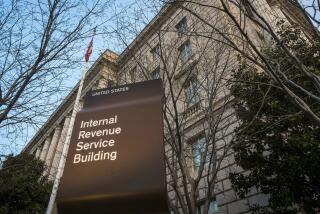Thanks a Lot
- Share via
It’s becoming an annual horror story, and this year it’s scarier than ever. The Internal Revenue Service concedes that, based on its own investigation, taxpayers who ask it for help are given wrong answers in one out of four cases. And that may be the good news. At the request of a congressional committee, the General Accounting Office ran its own check on how well the IRS is doing. It came up with an error rate of 39%. Both of these studies were limited to questions on the IRS’ toll-free hotlines. No effort has been made to find out how accurate are the answers given to taxpayers who personally seek help at an IRS office.
This year the IRS expects to receive 26 million telephone inquiries, 16% more than last year. Based on the IRS survey, those inquiries will produce 6.5 million wrong answers. If the more alarming GAO study is right, incorrect information will be provided in response to about 10.5 million questions. Through no fault of their own, a lot of taxpayers are going to be filing returns that con-tain mistakes. A lot of money is likely to be over-paid or underpaid as a result.
An IRS official says that taxpayers who can show that their mistakes were the result of wrong information from the agency probably won’t have to pay a penalty, although they are still liable for any underpayment of taxes. To prove that yougot bad advice, the IRS says, you should produce the date and time of your phone call and the name of the agent with whom you talked.
Last year a GAO survey found that the IRS gave incorrect answers to 21% of the questions asked it. The big increase this year--an error rate that has nearly doubled, according to the GAO’s investigation--is being blamed on a more complex tax code. The 1986 tax law changed 2,000 subsections of the tax law, and led to the revision of more than 200 forms. The result, IRS commissioner Lawrence Gibbs admits, is that everyone--taxpayers, professional tax preparers and the IRS--is having trouble coping.
More trouble means more expense. Surveys indicate that the cost of professional help in pre-paring tax returns is up 25% to 50% over last year. All this because of what Congress did when it set out to produce--yuk, yuk--a tax-simplification bill.
Early rewriting of the tax code to make it clearer seems unlikely. Any legislative effort to try to clean up the law could invite special-interest amendments and revisions that would threaten to upset the delicate political balance achieved two years ago. So for the time being things are likelyto remain as they are. Certainly the IRS shouldtry to better train the people, most of them sea-sonal employees, who field taxpayers’ questions over the phone. But if certified public accountants are having trouble understanding the tax code, it may be too much to expect that temporary IRS help can do better. It’s a problem, and as usual it’s the taxpayer who has to pay for it.
More to Read
Inside the business of entertainment
The Wide Shot brings you news, analysis and insights on everything from streaming wars to production — and what it all means for the future.
You may occasionally receive promotional content from the Los Angeles Times.









